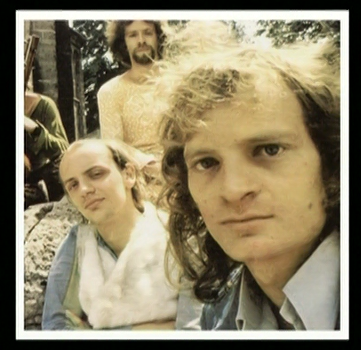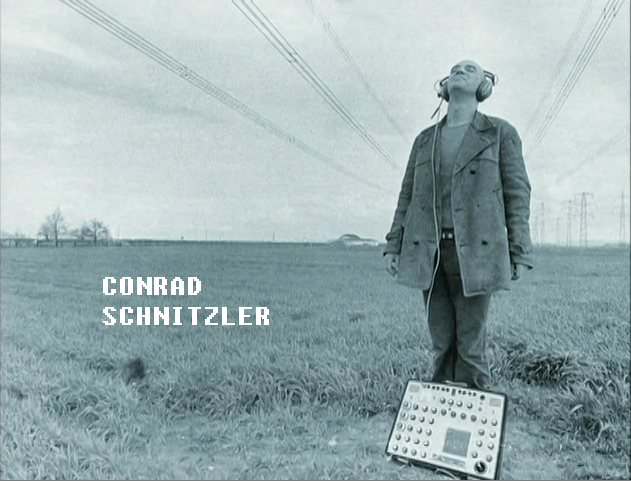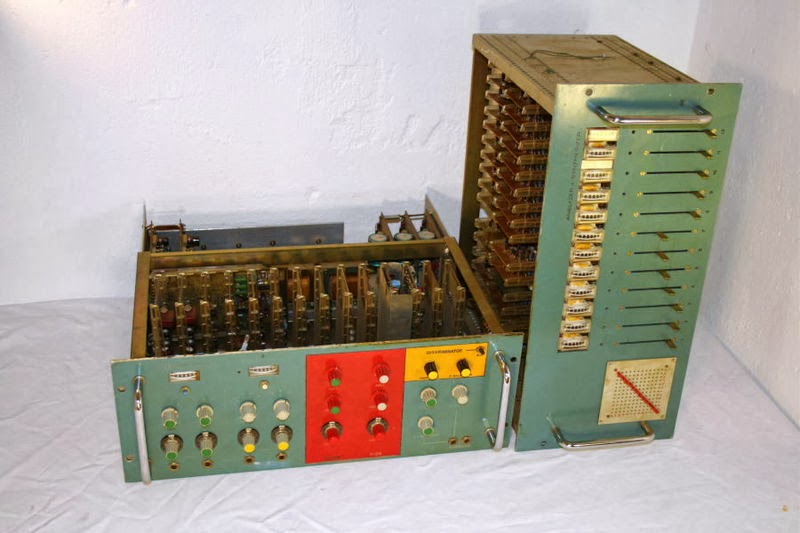Kraftwerk ("power station" in German) always seemed to be lurking on the periphery of everything I enjoyed over the last few decades, whether it was music for NES games / Harold Faltermayer or John Carpenter soundtracks in the 80s; raves, re-mixes and electronica in the 90s; or "weird art" and 70s/80s nostalgia here in the 21st century. Lurking is perhaps the wrong word; they seemed to permeate all of the above.
Not to mention Lebowski:
 |
| Not the actual band, of course, but the allusion is obvious. |
Instantly and endlessly compelling, visually, musically, conceptually, and technologically.
Who Are They? More than a few journalists and more than a few bands (including one of my favorites, New Order, one of the hundreds of bands to sample their work) have labeled Kraftwerk the most influential group of all time. Is this true? Perhaps. These days - when a single mega-computer at Clear Channel Entertainment HQ generates and determines what gets circulated into the musical ether, and millions of personal computer share infinite torrents of digital information each and every second - it's at the very least self-evident that more than most artists of the late 20th century, Kraftwerk looked into the future and saw exactly the shape of things to come.
The evolution of their influence is interesting to consider and ranges from the highly specialized to the mainstream.
- Giorgio Moroder, pioneer of "synth disco," took what Kraftwerk was doing and put it on the dance-floor with Donna Summer. This has happened more or less every year since, with the same successful results.
- Nearly all of early 80s "new wave" (Human League, Gary Numan, Soft Cell, etc.) is a variation on Kraftwerk. And not just that particular time and place; you can trace a line from Kraftwerk through New Wave / post-punk to Factory to Zooropa to trance to Radiohead to Daft Punk.
- Blue Man Group (less an homage and almost a parody.)
When the band announced a limited residency at London's Tate Gallery last year, the demand for tickets was so great that it overwhelmed that famous venue's box office. As reported in The Guardian:
"This made for a stark contrast with the reception Kraftwerk got when they
first tried playing this music in Britain. Thirty-eight years ago, for
their first British tour, hardly anyone bothered to turn up, while the
music press of the day apparently sent Basil Fawlty along to review
them: "Garbage floating down the polluted Rhine," offered the NME, in a
review under the headline This Is What Your Fathers Fought to Save You
From."
Music journalist and author Mark Prendergast notes in Kraftwerk and the Electronic Revolution that much like the Velvet Underground for so many US artists of the late 60s and 70s, nearly every UK artist of the late 70s and 80s traced their interest in recording and performing to either seeing or hearing Kraftwerk for the first time.
Current line-up: Ralf Hütter, Fritz Hilpert, Henning Schmitz, and Falk Grieffenhage.
Classic Line-up: Ralf, Florian Schneider, Karl Bartos, Wolfgang Flür.
Influences: (Among others) Steve Reich, Piet Mondrian and Josef Albers, Suprematism, Conny Plank, not to mention
 and Pierre Schaeffer, proponent of "musique concrete."
and Pierre Schaeffer, proponent of "musique concrete."
Context: The German countercultural scene was centered around three areas, Berlin, Munich, and Düsseldorf. While the music out of Berlin (such as Cluster) seemed to be fairly serious and the music out of Munich (such as Amon Duul) rather free-form, the music out of Düsseldorf reflected that region's distinctive contrasts.
 and Pierre Schaeffer, proponent of "musique concrete."
and Pierre Schaeffer, proponent of "musique concrete."Context: The German countercultural scene was centered around three areas, Berlin, Munich, and Düsseldorf. While the music out of Berlin (such as Cluster) seemed to be fairly serious and the music out of Munich (such as Amon Duul) rather free-form, the music out of Düsseldorf reflected that region's distinctive contrasts.
 |
| While it was a city associated with art movements and high fashion |
 |
| it was also a center of intense industrialization and technological innovation. |
Although all grouped under the arbitrary umbrella of "Krautrock" by the UK press, the German music scene produced a diverse range of material. While Kraftwerk's reach exceeded that of their contemporaries, here are three other well-known and well-deserving acts from the same period. First:
And last but not least, Popol Vuh:
 |
| Also known for movie soundtracks, albeit almost exclusively for the films of Werner Herzog: |
As technology grew more sophisticated over the course of the band's career, it became easier to take Kling Klang on the road. (Indeed, what once required a studio filled with wires, sequencers, vocoders, and synthesizers can now be achieved in a smartfone app; such are the wonders left to us thanks in large part to innovators such as Ralf, Florian and the gang.)
From the wiki:
"Johnny Marr of the Smiths
explained that anyone trying to contact the band
for collaboration would be told the studio telephone did not have a
ringer, since during recording, the band did not like to hear any kind
of noise pollution. Instead, callers were instructed to phone the studio
precisely at a certain time, whereupon the phone would be answered by
Ralf Hütter, despite never hearing the phone ring."
Chris Martin relays similar eccentric behavior when he contacted them for permission to sample "Computer Love" for Coldplay's song "Talk." Several weeks after writing them, he received an envelope with no return address that contained a handwritten reply on Kling Klang stationary that simply said "yes."
The internet age has expanded the Kling Klang Machine in even further ways.
 |
| Few bands sound so simultaneously of-their-era and of-the-future. |
Discography: The band's first three albums (Kraftwerk, Kraftwerk 2, and Ralf und Florian) are different enough from their subsequent catalog for Ralf to have claimed that 1974's Autobahn was the actual starting point for the band. They rarely perform anything from these albums in concert. Which is too bad, as they are great albums, especially in context of their later work.
Ralf und Florian in particular. In addition to showcasing some of their prettiest melodies, it is, as Mark Prendergast has noted, much more than simply a bridge to their later work. By making themselves the highly abstracted subject of the record, it's a lot like Kraftwerk's Sgt. Pepper's.
 |
| With Autobahn, the band streamlined what would become their signature sound: classical structure and melody in a computerized soundscape circling an identifiable theme. |
Side One is the 22-minute title track. Its chorus "Wir fahren fahren fahren auf der autobahn"("We drive drive drive on the Autobahn") recalls the Beach Boys i.e. "fun fun fun til her Daddy takes the T-Bird away," while the music evokes the feel of cruising along, slowing down and speeding up, the landscape pleasantly broken up by cities and roadside attractions, the ever-present womblike hum of the tarmac under the wheels.
This version from The Mix, a compilation CD where famous DJs remixed classic Kraftwerk tunes, is particularly cool. And at the risk of including far too many videos in this blog, here is a slice of classic psychedelia from Roger Mainwood set to the tune:
 |
| The band's next two albums, while absolute classics - basically, if you like Autobahn, you'll like everything else - were flops, more or less. |
 |
| Nevertheless, they brought the band to the increasing (and fevered) attention of artists such as David Bowie and Brian Eno. And with their next album, 1978's |
  |
| they returned to the charts en force. |
 |
| "Metropolis" was hugely influential and widely copied. As was "Spacelab:" |
In 1981, the band released my personal favorite of theirs: Computer World / Computerwelt. As was the case with the 2 previous albums and would be for their next 2, both an English and a German language version was released.
In an eeriely prescient review of the album, Chris Power wrote:
"The thrumming pulse of Computer World, its three-note melody glancing
like sunlight from its delicate breakbeats, houses one of Hütter’s most
insightful lyrics. Reeling off a list of governmental and financial
institutions – "Interpol and Deutsche Bank/FBI and Scotland Yard" – a synthetic voice provides the counterpoint of "Business, numbers, money, people".
With supreme economy the song charts the privacy-threatening
interconnectedness of our modern world; one the incipience of which was
far from blindingly obvious in 1981. The German-language version of the
track contains extra lines which are even more explicit about government
data collection."
Their next two efforts, though separated by almost 20 years, are somewhat similar. Less critically acclaimed but, to my ears anyway, no less atmospheric.
 |
| 1986 |
 |
| 2003 |
In their wake, undoubtedly, electronica mutated, regressed, and ultimately flourished.
As Andy McClusky of Orchestral Maneuvers in the Dark recently noted, “People always go back to how
the American blues was lifted by the British and turned into pop in the
Sixties, but that was a long time ago, and its reign was 20 or 30 years. When you listen to pop now, do you hear
the Beatles, or do you hear electronic, synthetic, computer-based grooves?”
McClusky speaks the truth, meine Damen und Herren. It's a Kraftwerk (computer)world, we just live in it.
Effect on Babies: One final note. My daughter, who's a few weeks shy of her first birthday, absolutely loves these guys. I was listening to them while cooking a few weeks ago and now she comes
in and cries to be picked up and then looks over at the stereo and
points. It's really cute. Then we bop back and forth and she usually
falls asleep in my arms. It's a surefire way to get her to relax; I offer this to all parents of infants and toddlers. Keep Kraftwerk at the ready.
 |
| She hasn't got the lyrics 100% yet, but we've got time. |
I'm greatly amused at the idea that in
years to come I will get misty-eyed when I hear things like "The
Robots" or "Computer World" and remember father-daughter bonding of
years past.
















